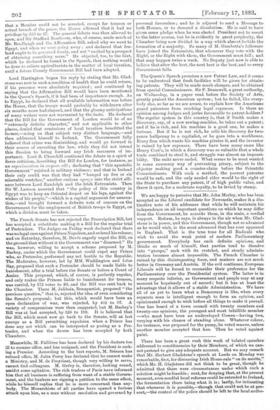Lord Hartington began his reply by stating that Mr. Glad-
stone was now in such a condition of health that he could return, if his presence were absolutely required ; and continued by saying that the Affirmation Bill would have been mentioned in the Queen's Speech, if it had been of importance enough. As to Egypt, he declared that all available information was before the House, that the troops would probably be withdrawn after six months more had elapsed, and that the gloomy anticipations of many writers were not warranted by the facts. He declared that the Bill for the Government of London would be of an " extremely definite character," and not applicable to other places, denied that remissions of local taxation benefitted the farmer,—using on that subjeet very distinct language,—and then addressed himself to Ireland. The Government fully believed that crime was diminishing, and would go forward in their course of executing the law, while they did not intend this Session to bring forward any Irish measures of im- portance. Lord R. Churchill continued the debate in a spirit of fierce criticism, describing the Bill for London, for instance, as an experiment= in ccnpore ; declaring that "this apostolic Government" rejoiced in military violence ; and that in Ireland their only credit was that they had "hanged up five or six miserable wretches," another curious apercu into the strict alli- ance between Lord Randolph and the Irish Extremists. Then Sir W. Lawson asserted that "the policy of this country in Egypt was to keep an Oriental despot on his legs, against the wishes of his people,"—which is a capital argument for annexe- tion,—and brought forward a definite vote of censure on the Government for the employment of British troops in Egypt, on which a division must be taken.














































 Previous page
Previous page